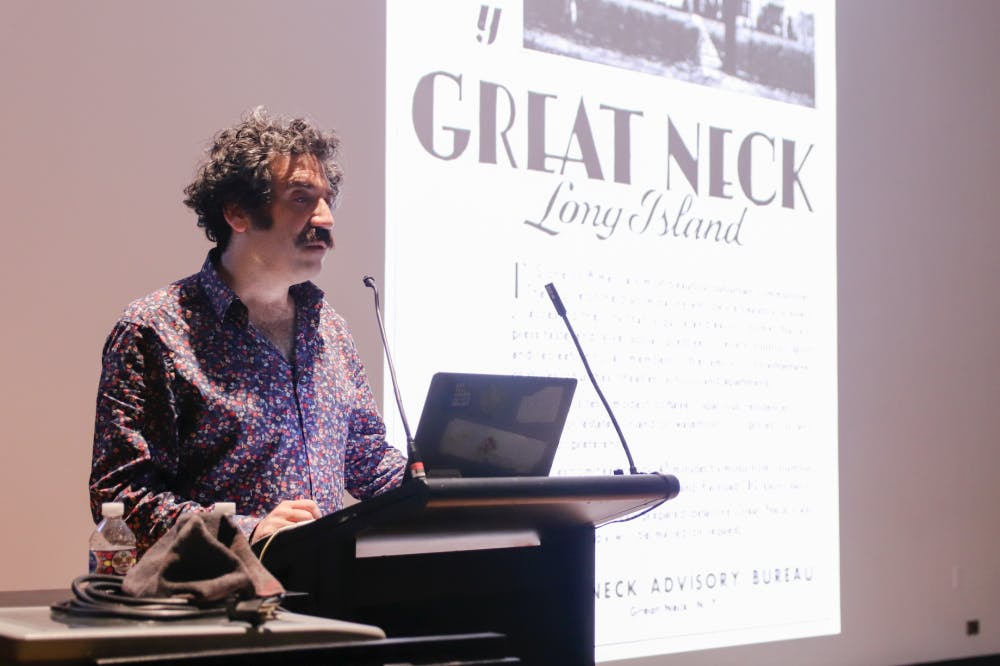Michael Rakowitz, an Iraqi-American conceptual artist, stepped into the List Art Building on the evening of Nov. 12 to present his latest gastronomic project, “A House with a Date Palm Will Never Starve,” a cookbook which features recipes from 41 chefs — himself included — that revolve around date syrup, a traditional Middle Eastern ingredient.
The lecture traced the inspirations behind Rakowitz’s personal projects with Iraqi dates and unraveled the political and cultural messages within cans of date syrup. The cookbook’s title refers to an ancient Mesopotamian proverb.
Rakowitz started his lecture with a photo of dead date palm trees — the fronds of the trees are discolored, and rotten fruits wrapped in plastic bags dangle gravely from their branches. Rakowitz went on to explain that these palm trees have been polluted by radiation resulting from the munitions that have bombarded Iraq since 2003.
The cookbook aims to honor the versatility of the date palm tree. “It’s the dates that will nourish the family, but it’s also the palm that is used for shade. And then it’s also the leaves that fall off the tree that can be woven for furniture and baskets and other components,” said Rakowitz while explaining the cookbook’s title. “Once the palm dies, (the wood) can be used to extend the house as the family itself expands,”
Rakowitz said he has used dates in his artwork since August 2004, when he first discovered red cans of date syrup in Sahadi’s, a Brooklyn grocery store that Rakowitz’s grandparents frequented to purchase Middle Eastern produce after they immigrated from Baghdad. “(The owner of Sahadi’s) told me that the date syrup is processed in the Iraqi capital, put into large plastic bags and then driven over the border to Syria, where it gets put into unmarked tin plate steel cans. (The syrup) then crosses the border into Lebanon, gets a label and is exported to the rest of the world,” said Rakowitz. He went on to explain that even though the United Nations hasn’t sanctioned Iraqi exports since 2003, Iraqi companies still employ this method to export goods because their products are widely considered unsafe by American consumers.
Rakowitz has used date syrup as a motif in his projects to examine the effects that prolonged military conflict has on a country, from the loss of historic artifacts to the forced displacement of civilians in war-torn Iraq.
“At its peak in the mid-’70s, the Iraqi date industry was a bit over 30 million date palms in the country. By the end of the Iran-Iraq war in 1988, this number had been halved to about 16 million. At the end of the 2003 invasion, only three million (trees) remained,” Rakowitz said.
In 2018, the artist used colorful date syrup cans to build a statue of the lamassu — an Assyrian deity that has a human head, a cow’s body and a bird’s wings — on the fourth plinth in London’s Trafalgar Square. This large-scale contemporary art installation, titled “The Invisible Enemy Should Not Exist,” recreated the ancient stone statue that was destroyed by ISIS in 2015. Rakowitz added that the lamassu intentionally faces outward so the statue is “in a stare down” with the iconic Trafalgar Square lions made of melted-down cannons. “The material culture of the victims of war are facing off against the weapons of war,” he explained.
Sophia Petros ’20 said that she was fascinated by the way Rakowitz has been able to work with a wide variety of mediums, from gastronomy to videography to sculpture.
“His work has a critical social dimension … (he makes) us aware of the intimate and at times uncomfortable relationships between artistic and gastronomic objects of culture, and cultures of people,” said Holly Shaffer, assistant professor of history of art and architecture, when introducing Rakowitz at the event.
Following the event, Rakowitz spoke with The Herald about his decision to withdraw from the 2019 Whitney Biennial in protest of Warren Kanders’ membership on the museum’s board. While Rakowitz described his withdrawal as “a private decision,” he said artists needed to support each other in holding powerful individuals accountable.
“Suddenly there was this question of why (I) was stepping in front of the achievements of so many other artists that are part of the most incredible and, in my mind, one of the most talented rosters of the biennial to ever happen. … There are many ways for us to protest this, and we are all implicated, we are all entangled. If we are going to truly divest, we’re going to need each other,” he said.





